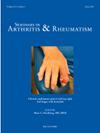造血干细胞移植、嵌合抗原受体t细胞和其他细胞疗法是严重硬皮病和其他自身免疫性疾病长期改善的垫脚石。
IF 4.6
2区 医学
Q1 RHEUMATOLOGY
引用次数: 0
摘要
遗传性和诱导性自身免疫性疾病(AIDs)的临床前模型表明,高剂量免疫抑制条件下的造血干细胞移植(HSCT)可以逆转器官损伤并改变艾滋病的病程。自体和异体造血干细胞移植的基本原理是基于免疫系统的重置。HSCT的临床应用最初集中于严重系统性硬化症(SSc),三个比较自体HSCT与标准环磷酰胺(CY)的随机试验显示,移植后12-54个月,SSc有显著改善。三项试验的荟萃分析显示,与CY相比,HSCT后全因死亡率的相对风险为0.5。最近,有报道称,CY/氟达拉滨制剂与CD19嵌合抗原受体(CAR) t细胞输注后,几种艾滋病的临床改善。在4-29个月的随访中,观察到主要的疾病反应和完全的b细胞重建,而副作用则不大。工业和学术中心正在积极开发这些和其他用于艾滋病治疗的细胞产品,包括CAR-NK、现成的car - t、嵌合自身抗体受体(car - t)和间充质间质细胞(MSCs)。MSC治疗后的临床改善已经有报道,但与CAR-T试验一样,随访时间仍然很短。对于自体造血干细胞移植,与考虑细胞治疗的患者共同决策可能更容易,因为我们有更长的随访时间,许多患者在临床上得到改善,并且在服用DMARDS后存活了几十年。这些人理所当然地认为自己已经痊愈了。因此,人们对细胞疗法在重症艾滋病长期改善中的作用产生了兴趣。本文章由计算机程序翻译,如有差异,请以英文原文为准。
Hematopoietic stem cell transplant, chimeric antigen receptor T-cells, and other cellular therapies as stepping stones toward long-term improvement in severe scleroderma and other autoimmune diseases
Preclinical models of inherited and induced autoimmune diseases (AIDs) have shown that hematopoietic stem cell transplantation (HSCT) following high-dose immunosuppressive conditioning could reverse organ damage and alter the course of AIDs. The rationale for both autologous and allogeneic HSCT has been based upon a reset of the immune system. Clinical application of HSCT was initially focused on severe systemic sclerosis (SSc) and three randomized trials comparing autologous HSCT with standard cyclophosphamide (CY) demonstrated significant improvement in SSc measured 12-54 months after transplant. Meta-analysis of the three trials showed the relative risk of all-cause mortality after HSCT was 0.5 compared to CY. More recently, clinical improvements in several AIDs have been reported with CY/fludarabine preparation followed by CD19 chimeric antigen receptor (CAR) T-cell infusion. With follow-up of 4-29 months, major disease responses and full B-cell reconstitution have been observed while side effects have been modest. Industry and academic centers are active in developing these and other cellular products for AID treatments including CAR-NK, off the shelf CAR-Ts, chimeric autoantibody receptor (CAAR-Ts), and mesenchymal stromal cells (MSCs). Clinical improvements after MSC administration have been reported, but as with the CAR-T trials, follow-up is still brief. Shared decision making with patients considering cellular therapy is perhaps easier for autologous HSCT since we have longer follow-up with many patients clinically improved and surviving off DMARDS for decades. Such individuals understandably view themselves as cured. Thus, the interest in the evolving role of cellular therapies in long-term improvement in severe AIDs.
求助全文
通过发布文献求助,成功后即可免费获取论文全文。
去求助
来源期刊
CiteScore
9.20
自引率
4.00%
发文量
176
审稿时长
46 days
期刊介绍:
Seminars in Arthritis and Rheumatism provides access to the highest-quality clinical, therapeutic and translational research about arthritis, rheumatology and musculoskeletal disorders that affect the joints and connective tissue. Each bimonthly issue includes articles giving you the latest diagnostic criteria, consensus statements, systematic reviews and meta-analyses as well as clinical and translational research studies. Read this journal for the latest groundbreaking research and to gain insights from scientists and clinicians on the management and treatment of musculoskeletal and autoimmune rheumatologic diseases. The journal is of interest to rheumatologists, orthopedic surgeons, internal medicine physicians, immunologists and specialists in bone and mineral metabolism.

 求助内容:
求助内容: 应助结果提醒方式:
应助结果提醒方式:


